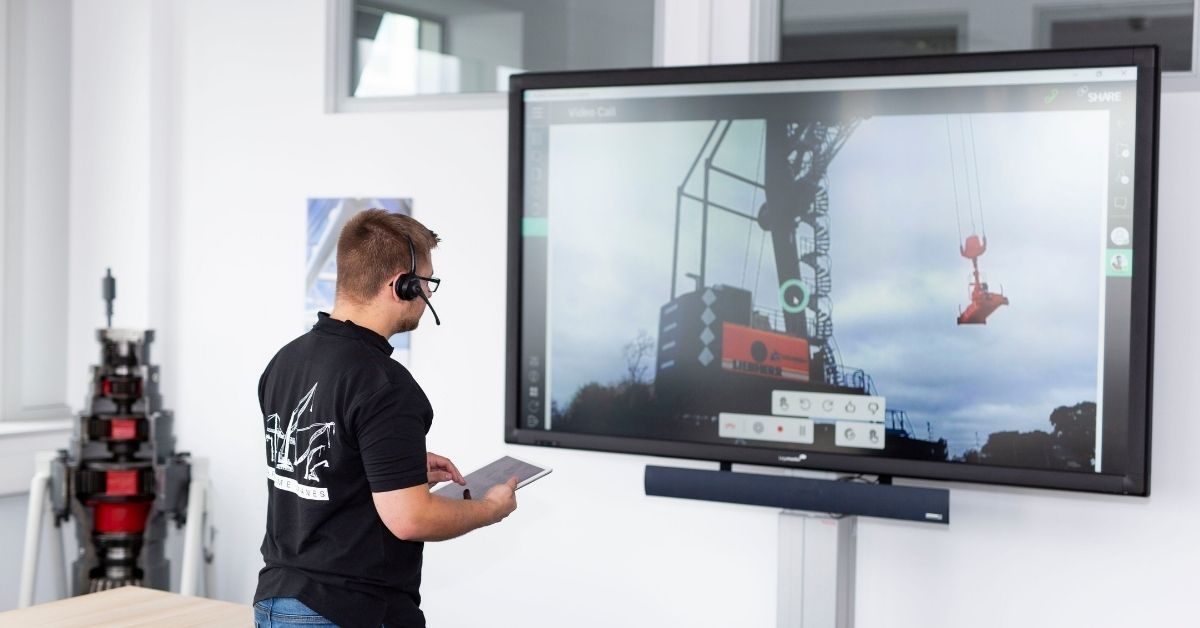Remote products are the topic of the hour and due to the Covid-19 pandemic in greater demand than ever. All the better that the Liebherr Group has been working for a long time on such innovative solutions and is able to offer its customers appropriate products for various applications – for remote maintenance as well as for collaboration with local technicians.
The coronavirus pandemic has given the digital transformation extraordinary impetus over the last year, demonstrating that there most certainly are solutions for performing work without being present on site. Such remote applications have many benefits and are currently experiencing a veritable boom. Liebherr has been working for many years on various remote products, now allowing the company to make use of these and to further expand its innovative technologies. Besides the application examples listed below, Liebherr also offers different solutions covering all product lines for making daily work easier and more efficient.
Remote maintenance at the push of a button
Liebherr’s Remote Service app is especially well suited as a diagnosis tool for repairs or for remote maintenance on cranes, excavators and construction machines. It can be used around the world in real time and can transmit visual information, allowing fast and efficient customer support when it is needed. Liebherr also offers remote diagnostics for its cranes of the latest generation. If a problem occurs, a service engineer would connect to the crane control via an encrypted mobile phone connection. So they could support the customer by troubleshooting the issue. Both remote tools allow issues with the machine to be identified more quickly, avoiding unnecessary journeys for maintenance – an especially important factor in times of corona and travel restrictions. Precise fault diagnosis allows the correct parts to be ordered so that the crawler crane, rope excavator, maritime crane, deep foundation machine or mobile crane can quickly be put back into operation.
Smart glasses for the right perspective
Smart glasses are a practical tool for providing fast assistance to customers in faraway places without having to send a technician around straight away. The glasses allow pictures to be simply shared and discussed. So this remote tool not only avoids the need for travel, but also saves substantial costs and makes customer service more efficient.
Liebherr is also testing this capability in its internal engineering and production in the Aerospace division. Virtual and augmented reality allows final inspections to be performed on a landing gear assembly using these glasses. In this case, the 3D model is superimposed on reality, enabling the inspector to examine the machine virtually “live” and to improve the quality inspection process.
Liebherr also uses smart glasses for earthmoving machines and material handling technology. This enables digital remote support for service and maintenance cases: the customer wears the smart glasses and a live image is transmitted directly to a Liebherr service technician. They then carry out a fault diagnosis and, ideally, find a solution to the problem.
Controlling container cranes from the office
Liebherr’s Remote Operator Station (ROS) has been developed for use with all Liebherr container crane products and offers flexibility in operations. The ROS is ergonomically designed and fitted with multiple displays allowing the operator to perform all normal driving functions from a remote office environment. Furthermore, the move to automation with remote control brings operational benefits, with a single ROS operator being able to operate several cranes simultaneously. Additional benefits include faster and easier shift changes, and a more attractive work environment for employees.
Mobility of the future
Besides construction and logistics, Liebherr is also active in the field of rail vehicle technology, where it develops remote solutions. The Train Control and Monitoring System (TCMS) allows Liebherr real-time access to its various subsystems. In regular travel operation, the system states are monitored and intervention is also possible from the development location during servicing. At the same time, the system can be used to monitor the control response in a test environment for the customer, e.g. for air-conditioning systems. This enables customers in product development to actuate the air conditioning equipment at a Liebherr location from anywhere in the world and test various operational situations in combination with other systems on the train – totally without costly time spent on site.







